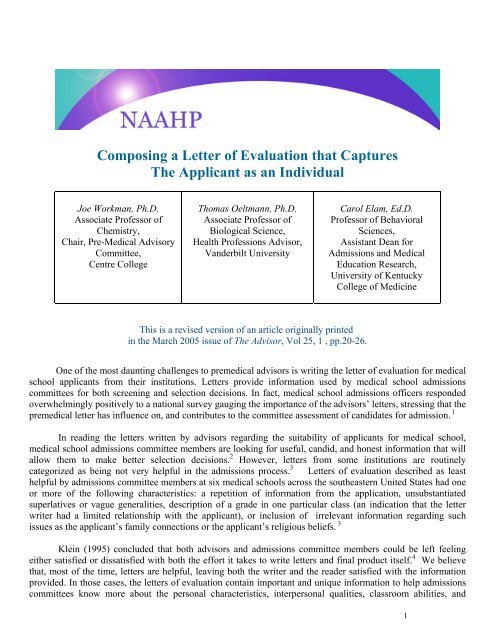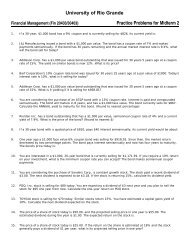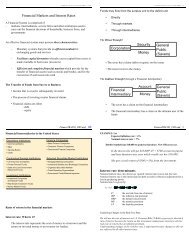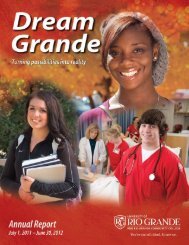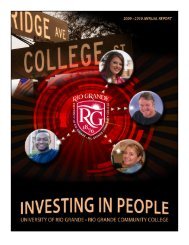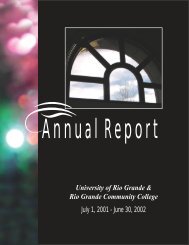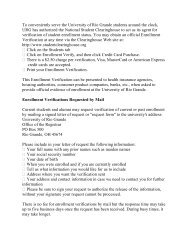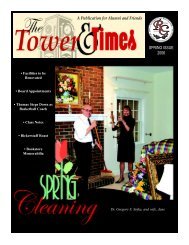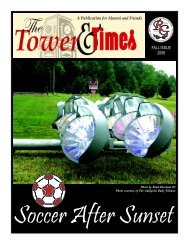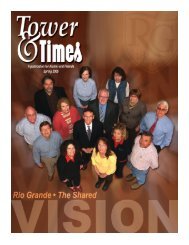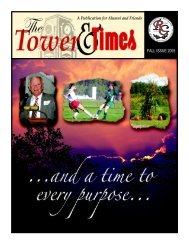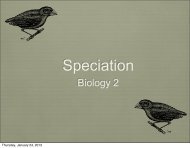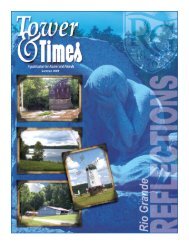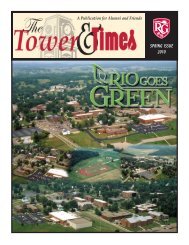Composing a Letter of Evaluation that Captures The - Pre-Medical ...
Composing a Letter of Evaluation that Captures The - Pre-Medical ...
Composing a Letter of Evaluation that Captures The - Pre-Medical ...
Create successful ePaper yourself
Turn your PDF publications into a flip-book with our unique Google optimized e-Paper software.
<strong>Composing</strong> a <strong>Letter</strong> <strong>of</strong> <strong>Evaluation</strong> <strong>that</strong> <strong>Captures</strong><br />
<strong>The</strong> Applicant as an Individual<br />
Joe Workman, Ph.D.<br />
Associate Pr<strong>of</strong>essor <strong>of</strong><br />
Chemistry,<br />
Chair, <strong>Pre</strong>-<strong>Medical</strong> Advisory<br />
Committee,<br />
Centre College<br />
Thomas Oeltmann, Ph.D.<br />
Associate Pr<strong>of</strong>essor <strong>of</strong><br />
Biological Science,<br />
Health Pr<strong>of</strong>essions Advisor,<br />
Vanderbilt University<br />
This is a revised version <strong>of</strong> an article originally printed<br />
in the March 2005 issue <strong>of</strong> <strong>The</strong> Advisor, Vol 25, 1 , pp.20-26.<br />
Carol Elam, Ed.D.<br />
Pr<strong>of</strong>essor <strong>of</strong> Behavioral<br />
Sciences,<br />
Assistant Dean for<br />
Admissions and <strong>Medical</strong><br />
Education Research,<br />
University <strong>of</strong> Kentucky<br />
College <strong>of</strong> Medicine<br />
One <strong>of</strong> the most daunting challenges to premedical advisors is writing the letter <strong>of</strong> evaluation for medical<br />
school applicants from their institutions. <strong>Letter</strong>s provide information used by medical school admissions<br />
committees for both screening and selection decisions. In fact, medical school admissions <strong>of</strong>ficers responded<br />
overwhelmingly positively to a national survey gauging the importance <strong>of</strong> the advisors’ letters, stressing <strong>that</strong> the<br />
premedical letter has influence on, and contributes to the committee assessment <strong>of</strong> candidates for admission. 1<br />
In reading the letters written by advisors regarding the suitability <strong>of</strong> applicants for medical school,<br />
medical school admissions committee members are looking for useful, candid, and honest information <strong>that</strong> will<br />
allow them to make better selection decisions. 2 However, letters from some institutions are routinely<br />
categorized as being not very helpful in the admissions process. 3 <strong>Letter</strong>s <strong>of</strong> evaluation described as least<br />
helpful by admissions committee members at six medical schools across the southeastern United States had one<br />
or more <strong>of</strong> the following characteristics: a repetition <strong>of</strong> information from the application, unsubstantiated<br />
superlatives or vague generalities, description <strong>of</strong> a grade in one particular class (an indication <strong>that</strong> the letter<br />
writer had a limited relationship with the applicant), or inclusion <strong>of</strong> irrelevant information regarding such<br />
issues as the applicant’s family connections or the applicant’s religious beliefs. 3<br />
Klein (1995) concluded <strong>that</strong> both advisors and admissions committee members could be left feeling<br />
either satisfied or dissatisfied with both the effort it takes to write letters and final product itself. 4 We believe<br />
<strong>that</strong>, most <strong>of</strong> the time, letters are helpful, leaving both the writer and the reader satisfied with the information<br />
provided. In those cases, the letters <strong>of</strong> evaluation contain important and unique information to help admissions<br />
committees know more about the personal characteristics, interpersonal qualities, classroom abilities, and<br />
1
exposure to medicine <strong>of</strong> applicants. 1 Such informative letters help establish good working relationships<br />
between the premedical advisor and the medical school admissions committee, by building a sense <strong>of</strong> trust in<br />
their content and communication.<br />
We contend <strong>that</strong> there is an art to writing letters <strong>of</strong> evaluation, and <strong>that</strong> some <strong>of</strong> the best approaches to<br />
letter writing can be learned. In this paper we will address two aspects <strong>of</strong> letter writing, obtaining the necessary<br />
information and crafting the language <strong>of</strong> the letter.<br />
Getting to Know the Students<br />
Where do advisors obtain information they use to write knowledgeable letters about their students’<br />
academic abilities, personality characteristics, relevant experiences, and overall suitability for a medical career?<br />
How do they come to know their students as unique individuals with unique qualities and circumstances?<br />
Ultimately, it is the applicant’s responsibility to provide information about herself or himself to both faculty and<br />
the premedical advisor. However, settings for interactions are many. Most premedical advisors serve as<br />
academic counselors to premedical students. <strong>Pre</strong>medical advisors holding faculty positions may teach aspiring<br />
medical students in their courses. Advisors with active research programs may employ students in their<br />
research laboratories. Some premedical advisors participate in study abroad programming and may come to<br />
know students in living and learning settings. Alternatively, premedical advisors may solicit comments from<br />
other faculty who know the applicant better.<br />
Advisors may also learn about their students through review <strong>of</strong> data related to their academic<br />
performances. To understand the student’s academic abilities, the advisor carefully examines the student’s<br />
academic record in college, including course work taken and grades earned. In preparing to describe the<br />
applicant’s academic aptitude and scholarship, it is helpful for the advisor to have knowledge <strong>of</strong> the student’s<br />
classroom behaviors including work ethic, preparation, and attendance. 1,3 Advisors usually have access to the<br />
student’s performance on the <strong>Medical</strong> College Admission Test (MCAT). Some advisors even have access to the<br />
student’s performance on college entrance examinations, such as the ACT or SAT. Through review <strong>of</strong><br />
standardized scores prior to admission to the undergraduate program, grade point averages attained in college,<br />
and MCAT scores, advisors can determine whether the student’s undergraduate performance is in keeping with<br />
his or her abilities as measured by standardized tests. Should student performance in the classroom fall short <strong>of</strong><br />
the expected aptitude, advisors can <strong>of</strong>ten clarify unique circumstances or hardships faced <strong>that</strong> may have<br />
influenced the applicant’s classroom performance in the letters they write.<br />
Writing the <strong>Letter</strong><br />
<strong>Pre</strong>medical advisors may work with applicants on their own, or with other faculty who comprise an<br />
advisory committee. <strong>The</strong> advisory committee members may come together to interview aspiring applicants to<br />
learn more about their accomplishments and personal qualities prior to contributing to the letter <strong>of</strong> evaluation.<br />
Within the premedical committee, individual faculty may each be asked to draft a separate letter on behalf <strong>of</strong><br />
selected students. When the premedical advisor sits down to write the letter <strong>of</strong> evaluation on an individual<br />
applicant, he or she draws information from the previously outlined interactions and sources. <strong>The</strong> premedical<br />
advisor may be asked to draft a singular letter, representing the committee, or make summary comments,<br />
interpreting and synthesizing the separate letters written by individual faculty members. <strong>Medical</strong> school<br />
admissions committee members usually report <strong>that</strong> it is also helpful for the advisor to rank the applicant in<br />
categories and compare the student to past successful applicants.<br />
2
Regardless <strong>of</strong> the authorship <strong>of</strong> the letter <strong>of</strong> evaluation, there are necessary topics <strong>that</strong> are deemed<br />
helpful by admissions committee members. Topics <strong>that</strong> should be incorporated in the letters include information<br />
addressing the personal characteristics (e.g., integrity, honesty, reliability, pr<strong>of</strong>essionalism, determination,<br />
leadership, and motivation) and social skills (e.g., interpersonal and communication skills, ability to interact in<br />
groups and establish peer relationships, empathy, and altruism) <strong>of</strong> the applicant. 3 Importantly, most admissions<br />
<strong>of</strong>ficers and admissions committee members value both positive and negative information on applicants as this<br />
combination typically gives them a realistic perspective <strong>of</strong> the applicant’s strengths and weaknesses. 5<br />
Crafting the Language: Addressing Personal Characteristics and Social Skills<br />
In thinking about the letter writing, it may be helpful to consider tips dispensed in composition classes <strong>that</strong><br />
are aimed at assisting students in writing good narration and description. To demonstrate logical thinking in<br />
composition, students are taught to approach their subject matter objectively, analyzing the varied points <strong>of</strong> view,<br />
and working to convey insight and understanding. 6 <strong>The</strong> same considerations apply in crafting the letter <strong>of</strong><br />
evaluation. Information <strong>that</strong> faculty obtain by knowing, teaching, advising, and working with the applicant is more<br />
helpful than providing lists <strong>of</strong> the applicant’s grades or activities <strong>that</strong> are readily available from the application<br />
materials. <strong>The</strong> analysis, insight, and understanding <strong>that</strong> advisors can supply in the letters <strong>that</strong> describe who the<br />
applicant is as a person receive great consideration by admissions committee members.<br />
Some authors <strong>of</strong> letters <strong>of</strong> evaluation have stated <strong>that</strong> they are unsure <strong>of</strong> the types <strong>of</strong> information about<br />
the personalities <strong>of</strong> their students <strong>that</strong> should be included in the narrative. <strong>The</strong>y have expressed difficulty in<br />
describing and interpreting student behaviors and attitudes. Because medical school admission committee<br />
members consider both positive and negative aspects <strong>of</strong> key personal qualities, social skills, and relevant<br />
experiences and abilities when selecting students who are suitable for entrance into the medical school, it is<br />
important to incorporate such information in the letters <strong>of</strong> evaluation.<br />
Examples <strong>of</strong> narrative comments extracted from letters <strong>of</strong> evaluation <strong>that</strong> describe the strengths and<br />
weaknesses <strong>of</strong> applicants are provided as follows. While we <strong>of</strong>fer these passages as descriptive samples <strong>of</strong><br />
qualities <strong>of</strong> individual students, we do not presume or desire <strong>that</strong> these statements should be incorporated into<br />
others’ letters verbatim. Rather, they serve as models <strong>of</strong> language <strong>that</strong> could be imitated in crafting the<br />
descriptive passages related to personal qualities <strong>of</strong> individual students. Samples <strong>of</strong> statements describing<br />
leadership, ability to work collaboratively, honesty and integrity, responsibility and dedication, motivation,<br />
empathy, communication skills, service to others, problem solving ability, exposure to the pr<strong>of</strong>ession, and<br />
common sense and judgement are provided. General definitions <strong>of</strong> strengths and weaknesses regarding each<br />
quality are given, and passages are categorized accordingly. Note <strong>that</strong> statements may be appropriate for more<br />
than one category. Some <strong>of</strong> the statements are derived from summaries <strong>of</strong> faculty evaluations constructed by the<br />
premedical advisor; others are from individual pr<strong>of</strong>essors. All have been modified to protect the identity <strong>of</strong><br />
students and their institutions.<br />
Leadership<br />
Strengths (ability to direct, organize, and/or take charge):<br />
“Leads by example and organizational skills, not by an assertive presence”.<br />
3
“Vanessa knows exactly when to lead and when to let go; when to speak and when to listen; when to<br />
assume control and when to delegate authority. She negotiates this delicate balance between leading and<br />
listening better than almost any other student I have seen.”<br />
“Melissa has excellent leadership ability. She has the ideas and the ability to convince others to act on<br />
them. She inspires respect and trust. She works well with others and is not abrasive or arrogant.”<br />
“This year John was given a difficult task <strong>of</strong> being the Resident Assistant for both upper class women<br />
and freshmen men. He did an exceptional job. He was very compassionate to residents on his hall who<br />
had severe physical and emotional difficulties. He provided creative educational and social<br />
programming for the residents and truly went above and beyond the call <strong>of</strong> duty. He maintains his calm<br />
under pressure and responds appropriately to crisis situations.”<br />
Weaknesses (concerns about passivity):<br />
“Marianne is definitely a good follower. She does not have the assertiveness, the strength <strong>of</strong> character,<br />
or ego to be an effective leader. She fits smoothly into groups, quietly going about the business <strong>of</strong> doing<br />
what is requested from her.”<br />
“Patricia can work well on a team, but I do not see her as a leader-she isn’t very aggressive and does not<br />
like to tell people what to do.”<br />
“Peter will have more problems with interpersonal matters because he tends to be on the quiet side. He<br />
interacts with a lot <strong>of</strong> people, but he does not seem to contribute as much.”<br />
“My impression is <strong>that</strong> Ellen, although not really a loner, is nevertheless comfortable working alone.<br />
She could work in a team, but I do not think she would seek its leadership.”<br />
Ability To Work Collaboratively<br />
Strengths (skill in bringing others together in a constructive manner):<br />
“Stephanie works well with others. She is an outstanding and dedicated leader, or a cooperative group<br />
member. She has shown a real willingness to reach out and get involved in a variety <strong>of</strong> different settings<br />
and with all different kinds <strong>of</strong> people.”<br />
“I owe him something <strong>of</strong> a debt. He was one <strong>of</strong> those rare students who function as catalysts for the<br />
entire class. His intellectual curiosity and willingness to participate set the tone for a whole term <strong>of</strong><br />
"Introduction to Humanities" and made my life as a teacher much easier.”<br />
“While performing well in my classes was important to him, he seemed equally dedicated to<br />
understanding the science beyond what was going to be on the exam. His presence in class was<br />
refreshing because he was always willing to answer difficult questions even if he looked foolish. He was<br />
very generous with his time when it came to assisting other students who were having difficulty with the<br />
material. <strong>The</strong>re is usually a good atmosphere in the class when the top student is not competitive.”<br />
4
“I look forward to Mike’s contributions to our group meetings. He takes the discussions very seriously.<br />
He listens first and then speaks only when he has something meaningful to contribute. As a result, his<br />
peers hang on every word and really seem to value his opinion.”<br />
Weaknesses (concerns about social skills and/or control within a group):<br />
“He seems not to be part <strong>of</strong> any group. He is able to reach decisions and take actions independent <strong>of</strong><br />
others.”<br />
“While Susie is active in a couple <strong>of</strong> organizations on campus, she normally goes her own way and does<br />
what she considers to be <strong>of</strong> interest to her and <strong>of</strong> importance to her.”<br />
“He takes great pride in fastidious techniques <strong>that</strong> nearly always produce accurate and precise results.<br />
He works very well with other bright students. When paired with students less capable than he, though,<br />
he tends to dominate the group a bit.”<br />
“<strong>The</strong>resa has an abundance <strong>of</strong> self-confidence. Although this confidence is merited by her abilities, she<br />
has yet to master the skill <strong>of</strong> communicating her level <strong>of</strong> pr<strong>of</strong>iciency without alienating her colleagues.”<br />
Honesty and Integrity<br />
Strengths (high moral standards and values):<br />
“She is an especially conscientious, and honest person. <strong>The</strong>se qualities are so basic to her personality<br />
<strong>that</strong> she inspires an unusual amount <strong>of</strong> trust from others. Her integrity and honesty are <strong>of</strong> the highest<br />
order.”<br />
“Unlike some students who participate in activities simply to broaden their resumes or to earn praise,<br />
Mike does everything with a purpose and the intention <strong>of</strong> making a difference with no desire for<br />
recognition.”<br />
“As an RA in a freshman hall, Nick dealt with several delicate situations pr<strong>of</strong>essionally, and with an<br />
easy, natural manner. He was able to enforce all college policies and regulations without alienating his<br />
peers and earned their respect and friendship in the process.”<br />
“As a captain <strong>of</strong> the baseball team, he had to make decisions <strong>that</strong> pitted him between the coaches and his<br />
teammates. He was willing to make a decision <strong>that</strong> he believed was right, even though his teammates did<br />
not agree.”<br />
Weaknesses (concerns about morality, deception, or reputation):<br />
“You will notice from John’s transcript <strong>that</strong> he received an “F” grade in Organic Chemistry during the Spring<br />
<strong>of</strong> his sophomore year. This was the result <strong>of</strong> an unfortunate incident involving the university Honor Code.<br />
John has assured me <strong>that</strong> he will address the details surrounding this incident in his personal statement on the<br />
AMCAS application.”<br />
5
“My concern regarding Ian’s integrity relates to a situation where he had the opportunity to take<br />
leadership and stem some poor attitudes <strong>that</strong> were being detrimental to our soccer team. Rather, he<br />
allowed them to continue and, in my opinion, silently encouraged them to continue. This situation<br />
illustrates my concern for Ian and is an area where he needs to mature.”<br />
Responsibility and Dedication<br />
Strengths (ability to be accountable and complete commitments as expected):<br />
“Matt is obviously disciplined, perseverant, and thorough in his work. He is a very admirable student<br />
and one I could easily regard as a pr<strong>of</strong>essional colleague.”<br />
“Catherine is an extremely hard worker, is self-motivated, and self-reliant. She is aware<br />
<strong>of</strong> her duties and completes them. In terms <strong>of</strong> her perseverance and application, she is<br />
absolutely first rate.”<br />
“He completes what he starts and works until he is done. He applies himself to the task at hand with a<br />
minimum <strong>of</strong> fuss. He has excellent work habits and self discipline.”<br />
“Alan has been a paramedic for five years and carries this responsibility when he is not on the job. He<br />
keeps surgical gloves and a breathing aid in his backpack just in case his expertise is needed. He has<br />
impressed me with his stories <strong>of</strong> dealing with life-threatening situations as well as dealing personally<br />
with patients and their families. Alan has a very cool, calm disposition <strong>that</strong> will allow him to interact<br />
positively with his patients and colleagues.”<br />
Weaknesses (concerns about priority setting, purposefulness):<br />
“One must point out <strong>that</strong> his academic performance may reflect the added effort expended on<br />
organizing his rock band and performing at many social activities on campus; perhaps a sign <strong>of</strong><br />
misplaced priorities.”<br />
“Mary’s undergraduate performance reflects the undirected efforts <strong>of</strong> a potentially bright student. Since<br />
she has dedicated her efforts towards medical school, her grades have been more reflective <strong>of</strong> her<br />
ability.”<br />
“He is committed to medical school, but he gets so involved in so many things as to be distracted from<br />
the main mission. His energies have not always been directed towards academic matters. He is capable<br />
<strong>of</strong> much better grades and it seems likely <strong>that</strong>, away from the distractions <strong>of</strong> undergraduate life, he will<br />
demonstrate this.”<br />
“His decision to not engage me in a more formal conversation about his medical school application<br />
process is indicative <strong>of</strong> the too laid-back approach he has taken to his academic pursuits. He is a nice,<br />
pleasant individual with a great deal <strong>of</strong> academic potential who just does not rise to the high standards<br />
<strong>that</strong> he is capable <strong>of</strong> pursuing.”<br />
6
Motivation<br />
Empathy<br />
Strengths (ability to direct focus, manage time):<br />
“Jane is extremely well adjusted and highly motivated. She maintains a positive outlook regardless <strong>of</strong><br />
any situation. She is resilient and self-assured while still acknowledging how much she has to learn.”<br />
“She has the ability to make tough decisions when it is necessary. She knows what has to be done to<br />
reach her goals and she is willing to back these decisions with work. Carey is highly motivated and takes<br />
responsibility for her own learning but seeks advice comfortably.”<br />
“Since she is a single mother who puts in many hours a week working to support herself and her<br />
daughter, she is clearly juggling much more than the traditional student. <strong>The</strong> hardships she has<br />
overcome and the experiences she has had make her much more qualified for medicine than many<br />
students. I can only say <strong>that</strong> her achievements in the face <strong>of</strong> such opposition humble me.”<br />
“I have recognized in Jason a constant search for a challenge. His high GPA is evidence <strong>of</strong> the way he<br />
approaches his academics. His grades are all the more remarkable when considering his extra-curricular<br />
activities. Jason is on three varsity sports teams, he is a beautiful glass blower and accomplished<br />
ceramicist.”<br />
Weaknesses (lack <strong>of</strong> drive, questions regarding internal or external locus <strong>of</strong> control):<br />
“I feel <strong>that</strong> Mr. Carter is not strongly motivated. Whatever the reason, his performance has definitely<br />
been lackluster. If he could take additional science courses and show improvement, no doubt I could<br />
raise my level <strong>of</strong> enthusiasm for him.”<br />
“He has been planning on going to medical school since I have known him, but he has not been able to<br />
clearly explain why whenever I have asked him about it. He certainly has the intellectual ability to do<br />
well, just not a lot <strong>of</strong> passion.”<br />
“Bill seemed to me to be an underachiever. He did tremendously well on the MCAT, but I do not know<br />
him well enough to say <strong>that</strong> his performance on standardized tests will translate into success in medical<br />
school. My major reservation is Bill’s lack <strong>of</strong> a strong work ethic. Perhaps he will mature rapidly in<br />
medical school in this regard.”<br />
“Although Will’s GPA <strong>of</strong> 3.5 is solid, his performance in my class, in which he earned a B, was not as<br />
strong as our premed students <strong>that</strong> I recommend with greater enthusiasm. I am not aware <strong>of</strong> his<br />
involvement in extracurricular activities <strong>that</strong> might have placed a time constraint on him. <strong>The</strong> other<br />
reason <strong>that</strong> I do not recommend Will more enthusiastically is <strong>that</strong> I do not see the leadership potential or<br />
the level <strong>of</strong> maturity <strong>that</strong> I expect <strong>of</strong> premeds at his stage. Will <strong>of</strong>ten seems to be negative in his outlook.<br />
I have heard several times from colleagues <strong>that</strong> Will questions his instructors on missed exam questions,<br />
as if the instructor is at fault for his mistake.”<br />
Strengths (ability to understand others’ feelings or ideas):<br />
7
“Mary has participated in a wide variety <strong>of</strong> campus activities but, for her, the most important has been<br />
her involvement with the Magdalene House, a half-way house for former prostitutes and substance<br />
abusers. She especially enjoys being a role model for these women and helping them to recover their<br />
self respect.”<br />
“As hard as he worked for himself, he had a genuine concern for other students and tried to assist them<br />
whenever possible. I found his insights on the problems many students were having in my class to be<br />
very valuable for my efforts to improve my teaching.”<br />
“Larry served as one <strong>of</strong> the student coordinators for four major campus blood drives. His initiative in<br />
preparation for the events was impressive. He and her partner handled every detail <strong>of</strong> the event. <strong>The</strong>y<br />
recruited donors as well as volunteers to staff the drive. <strong>The</strong>y also managed the publicity as well as the<br />
communication with the blood center staff. Even more impressive <strong>that</strong> the work leading up to the drive<br />
was the way Larry conducted himself during the event. Any moment not in class was spent at the drive<br />
making sure everything ran smoothly. With his easy manner, Larry managed to put donors at ease.”<br />
“Jane really separates herself from the typical pre-med student in her personal characteristics. She has a<br />
quiet confidence <strong>that</strong> serves her well. She is a very good listener and sets people at ease. I admire her<br />
for her involvement as a rape-crisis volunteer. She seems ideally suited for this service because <strong>of</strong> her<br />
even temper and sympathetic nature. You cannot talk to Jane for any period <strong>of</strong> time without knowing<br />
she listened and understood your point <strong>of</strong> view. Her interest in medicine comes from a journey <strong>of</strong> selfdiscovery<br />
and introspection.”<br />
Weaknesses (Lack <strong>of</strong> insight or care into the feelings <strong>of</strong> others):<br />
“She’ll be at the top <strong>of</strong> her class in medical school, and somewhere along the way in the next 4-8 years,<br />
her hard-driving, sometimes tactless, approach to interacting with people will be tempered with<br />
appropriate restraint and empathy.”<br />
Communication Skills<br />
Strengths (ability to interact interpersonally):<br />
“She is an outgoing person. She is at ease with her peers or elders and has no difficulty in<br />
communicating. She is never at a loss for words and always seems to be at ease.”<br />
“Paul is very articulate, poised and able to adjust his style and methods <strong>of</strong> presentation to both his<br />
audience and for the specific purpose <strong>of</strong> the communication.”<br />
“Billy is a very effective communicator. He speaks with clarity, maturity, and decisiveness. He is a<br />
‘straight shooter’ who has learned tact.”<br />
“Brian’s outstanding intellectual skills are matched by his written and oral communication abilities.<br />
Brian is one <strong>of</strong> the finest technical writers I have ever encountered. He has a style <strong>that</strong> is engaging<br />
without sacrificing scientific accuracy. His paper on the Diels-Alder reaction was clearly the best in the<br />
organic chemistry class. Brian did far more research than anyone else and effectively conveyed the<br />
8
mechanism and synthetic aspects <strong>of</strong> this reaction. His oral presentation was similarly excellent. Brian is<br />
a poised speaker with a thorough understanding <strong>of</strong> how to use visual aids and how to pitch his talk to the<br />
level <strong>of</strong> his audience.”<br />
Weaknesses (exhibits behaviors <strong>that</strong> distract from interpersonal relations: extreme shyness, inability to<br />
sustain conversation, poor eye contact):<br />
“He is quiet and not at all outgoing. He is not easy to talk with and usually does not say much”.<br />
“He is rather self-centered, if not boastful. His behaviors may range from too much confidence to<br />
approval seeking.”<br />
“He was a good student, but what struck me the most was his unwillingness (inability?) to speak up in<br />
class. I always had the impression <strong>that</strong> he did not want to be in class. Even in lab he was quiet, although<br />
his lab partner was quite friendly and outgoing.”<br />
Service To Others<br />
Strengths (demonstration <strong>of</strong> altruistic behaviors toward others):<br />
“Mary has a long history <strong>of</strong> volunteer work dating back to junior high school. Her dedication to service<br />
has only increased during her college years. Although Mary has participated in a wide variety <strong>of</strong> campus<br />
activities, the most important to her has been tutoring three afternoons a week at an inner-city middle<br />
school. She has been tutoring for the past two years and will continue throughout her senior year.”<br />
“She is a mover and a shaker and gets things done. Last year she was in charge <strong>of</strong> the Humane Society<br />
and conducted a dog/cat food drive on campus and also worked with their employees to bring animals to<br />
campus for several hours.”<br />
“Being a cook at the Union Mission every Friday night and Saturday morning has been an important<br />
part <strong>of</strong> Bob’s college life. As far as I know, he has not missed this weekend activity for the past two<br />
academic years. He certainly is enthusiastic about this activity and looks forward to creating new<br />
recipes during his senior year.”<br />
“Hospital volunteer work has been a big part <strong>of</strong> Michelle’s college career. She spends six hours a week<br />
reading stories to patients or helping children with homework assignments at the children’s hospital.”<br />
Weaknesses (lack <strong>of</strong> altruistic activity):<br />
“Bob has not been heavily involved in volunteer activities during the school year. Most <strong>of</strong> his out <strong>of</strong><br />
class time has been involved with his fraternity, in which he holds an elected <strong>of</strong>fice, and intramural<br />
sports.”<br />
“Working to complete and honors thesis in molecular biology has consumed the majority <strong>of</strong> Sam’s out<br />
<strong>of</strong> classroom time. Because <strong>of</strong> his strong dedication to his research project, he has not been as involved<br />
in volunteer service projects as most <strong>of</strong> our other premed students. I do not see this as a weakness but<br />
rather a reflection <strong>of</strong> his interest.”<br />
9
“Mr. Smith seems to have a weakness in demonstrated service to others. Although he has done some<br />
volunteer work at a VA hospital in his hometown, he has created the impression <strong>that</strong> he did not know<br />
what medical school is all about.”<br />
Problem Solving Ability<br />
Strengths (ability to approach problems in calculated manner):<br />
“She has outstanding intellectual ability and her analytical skills are superb. Although she has double<br />
majored in engineering and math, she has used elective time effectively to pursue humanity courses in<br />
the College <strong>of</strong> Arts and Science.”<br />
“<strong>The</strong> thing I found most refreshing about Mary is <strong>that</strong> she took full responsibility for her initial<br />
shortcomings and took the appropriate steps to overcome them. We had the typical 'I bombed your first<br />
exam, but want to know how to improve' conversation. <strong>The</strong> difference between Mary and most students<br />
with which I have <strong>that</strong> conversation is <strong>that</strong> Mary took my advice to heart and made the appropriate<br />
adjustments in her study habits. She showed up regularly at my <strong>of</strong>fice hours and came prepared with<br />
questions. She also asked for additional problems to make sure she was ready for the exams. She<br />
demonstrated the kind <strong>of</strong> resolve she will need to succeed in medical school.”<br />
“Not only did Dan answer the vast majority <strong>of</strong> questions on every exam correctly, he did so incredibly<br />
clearly and succinctly, as if he had mulled over the question for hours and drafted the best response<br />
possible.”<br />
“Before the research started I thought <strong>that</strong> I would have to spend a lot <strong>of</strong> time in the lab with Matt to<br />
make sure he was doing things correctly. It quickly became evident <strong>that</strong> he was able to work<br />
independently and make excellent decisions about the direction <strong>of</strong> the research. By the end <strong>of</strong> the<br />
summer Matt was in complete control <strong>of</strong> the research and already formulating future projects.”<br />
Weaknesses (muddled thinking):<br />
“In looking over her academic record, I feel a bit insecure with her ability to handle the rigors <strong>of</strong> medical<br />
school. Judging from her performance in my class, she seems to be able to memorize but cannot apply<br />
knowledge to new problems when taken out <strong>of</strong> context.”<br />
“As a first term sophomore, Anne enrolled in my Human Animal class and earned a C+. Although she<br />
did write a very good disease paper for the class, her overall exam performance was consistently in the<br />
'C' range. Her final exam actually fell into the 'D' range. Of the 30 students enrolled in this particular<br />
section <strong>of</strong> the course, I know <strong>that</strong> at least 6 <strong>of</strong> them are currently in medical school. Of these six, two<br />
earned a B+, two earned an A- and two earned an A. Anne’s C+ seems especially uncompetitive given<br />
this comparison.”<br />
“Sarah’s academic performance in her other upper level science classes has been mediocre. It appears<br />
<strong>that</strong> Sarah was well-prepared as a freshman, but has faltered somewhat in the more advanced classes.”<br />
10
“Lisa was able to grasp general concepts, but she had difficulty seeing the connections between the<br />
concepts and solving problems using them. She always gave the impression <strong>that</strong> she understood<br />
everything, but she never backed it up on exams. She never took my advice for improving her grade.”<br />
Exposure To <strong>The</strong> Pr<strong>of</strong>ession<br />
Strengths (knowledge <strong>of</strong> and experience in the medical pr<strong>of</strong>ession):<br />
“Together with his work as an emergency medical technician at the university emergency department,<br />
Steve has had outstanding exposure to the field <strong>of</strong> medicine, including extensive patient contact. Steve<br />
has drawn blood, performed CPR, applied slings and casts, and taken vitals – experiences well beyond<br />
those <strong>of</strong> our typical premed students. I rate his sincerity <strong>of</strong> interest in and knowledge <strong>of</strong> medicine as<br />
truly superior.”<br />
“As far as knowledge <strong>of</strong> the medical field, Joe has more experience than almost every other applicant I<br />
have encountered in my 10 years here. He worked for a year as a unit secretary at the university hospital<br />
and then six months after <strong>that</strong> as an emergency medical technician. He also did a six-week internship in<br />
a stroke rehabilitation clinic. He earned his EMT license while carrying a full course-load and playing<br />
soccer. Clearly his time-management skills are exceptional. When I have heard Joe speak about his<br />
experiences as an EMT, I have noted <strong>that</strong> he has a firm understanding <strong>of</strong> many different aspects <strong>of</strong> the<br />
medical pr<strong>of</strong>ession. His sense <strong>of</strong> compassion and empathy are very strong. He has enjoyed the challenge<br />
<strong>of</strong> being part <strong>of</strong> a medical team and I know he is looking forward to leading <strong>that</strong> team when he becomes<br />
a physician.”<br />
“While he was in France, Tony fell ill (as most students in this age group do after their week-long break<br />
from class) and we took him to see a French physician. Tony spent his time in the <strong>of</strong>fice comparing the<br />
facilities, the doctor's approach, and procedures to those <strong>that</strong> he had seen in the United States. Despite<br />
his weakened state caused by an advanced sinus infection, he nevertheless found the strength to ask his<br />
physician numerous questions about the pr<strong>of</strong>ession and then to analyze the cultural differences between<br />
the two countries and their methods.”<br />
“I met Rob when he was a prospective student on his first visit to our institution. He was interested in<br />
medicine so I asked him why he wanted to become a physician. Most high school students give very<br />
poor answers to <strong>that</strong> question, mostly due to immaturity and a lack <strong>of</strong> real knowledge. Rob, however,<br />
gave the best answer I had ever heard from a high school student. He was able to articulate motivation to<br />
become a physician based on a combination <strong>of</strong> experiences as a lifeguard and the scientific research he<br />
had done at the university cancer center.”<br />
Weaknesses (lack <strong>of</strong> insight into the lives and responsibilities <strong>of</strong> physicians and/or the health care<br />
system):<br />
“Although both <strong>of</strong> her parents are physicians, she has not been involved in any activity to gain additional<br />
exposure to the field <strong>of</strong> medicine. She has worked in her parent’s <strong>of</strong>fice during the summer months,<br />
mostly doing clerical work.”<br />
11
“In our interview with him we found <strong>that</strong> he lacked the warmth <strong>that</strong> characterizes the majority <strong>of</strong> our<br />
applicants. He had some difficulty conveying to us his reasons for becoming a physician. This summer<br />
he will volunteer in a hospital which may give him greater insights to his goal as well as exposing him to<br />
a service role <strong>that</strong> he has lacked.”<br />
“Her interview with us was poor because she could not articulate good answers, nor was she able to<br />
explain her motivation for becoming a physician. She must put herself in a position where she can<br />
discover her reasons for wanting to become a physician.”<br />
“Although I think she could successfully complete medical school, I feel <strong>that</strong> Ann is taken by the<br />
glamour <strong>of</strong> becoming a doctor — I really doubt <strong>that</strong> she fully appreciates the amount <strong>of</strong> work and<br />
dedication it will take to get there.”<br />
Common Sense And Judgment<br />
Strengths (level-headed practicality in decision-making):<br />
“Her good common sense and fine judgment are beyond expectations for<br />
some one at this stage <strong>of</strong> intellectual development. Exceptionally mature, quietly<br />
self-confident but strong and decisive.”<br />
“Very practical and down to earth. She uses good judgment and has no problems<br />
making decisions.”<br />
“I was tremendously impressed at how he handled the aftermath to his horrible injury. David never<br />
blamed the quality <strong>of</strong> health care <strong>that</strong> he received and maintained his poise and good humor throughout<br />
his long hospital stays. He never asked for special accommodations from his pr<strong>of</strong>essors and never pitied<br />
himself.”<br />
“He is the most sought-after chemistry laboratory assistant because <strong>of</strong> his patience, his responsible<br />
attitude, and his communication skills.”<br />
Weaknesses (Lack <strong>of</strong> ability to make day-to-day decisions):<br />
“Tim does not seem to be decisive; he occasionally needs reassurance.”<br />
“Sarah seeks advice when she feels she needs it, and takes it into consideration when making decisions.<br />
She is a very practical young woman but is sometimes hesitant in making hard decisions.”<br />
“Bob’s record shows <strong>that</strong> he has made some inappropriate social decisions. He could be one <strong>of</strong> our very<br />
best students, but right now he is underachieving.”<br />
12
References<br />
1. Chapman, C.P., & Lane H.C. Perceptions about the use <strong>of</strong> letters <strong>of</strong> recommendation. <strong>The</strong> Advisor. 1997;17:31-36.<br />
2. Seiden, D. Can We Do Our Jobs and Maintain Our Integrity? <strong>The</strong> Advisor. 2001; 21(3):7-8.<br />
3. Elam, C.L., Edwards, J.C., Comeau, R., Taylor, E.D., Hinkley, R., Heldberg, C., & Johnson, M.M.S. <strong>Letter</strong>s <strong>of</strong> Recommendation: <strong>Medical</strong><br />
School Admission Committee Members’ Recommendations. <strong>The</strong> Advisor.1998; 18:4-6.<br />
4. Klein, J.F. Critical features for the letter <strong>of</strong> recommendation. <strong>The</strong> Advisor. 1995; 15:16-24.<br />
5. Elam, C.L., Davis, D. Oyewole, S. H. Dealing with Negative Information: A Dilemma for <strong>Pre</strong>medical Advisors and Admissions Officers.<br />
<strong>The</strong> Advisor. 2001; 21(3): 9-12.<br />
6. Kytle, R. Clear Thinking for Composition. New York: Random House, 1969.<br />
13


